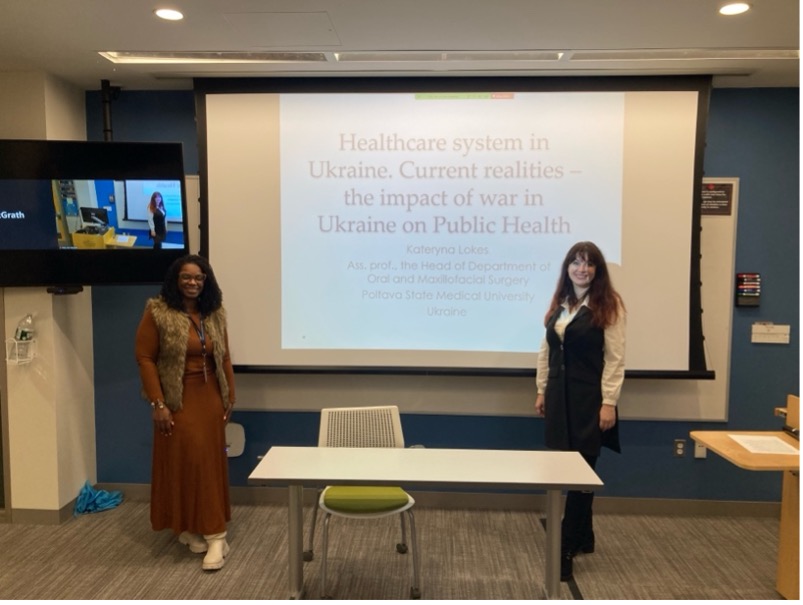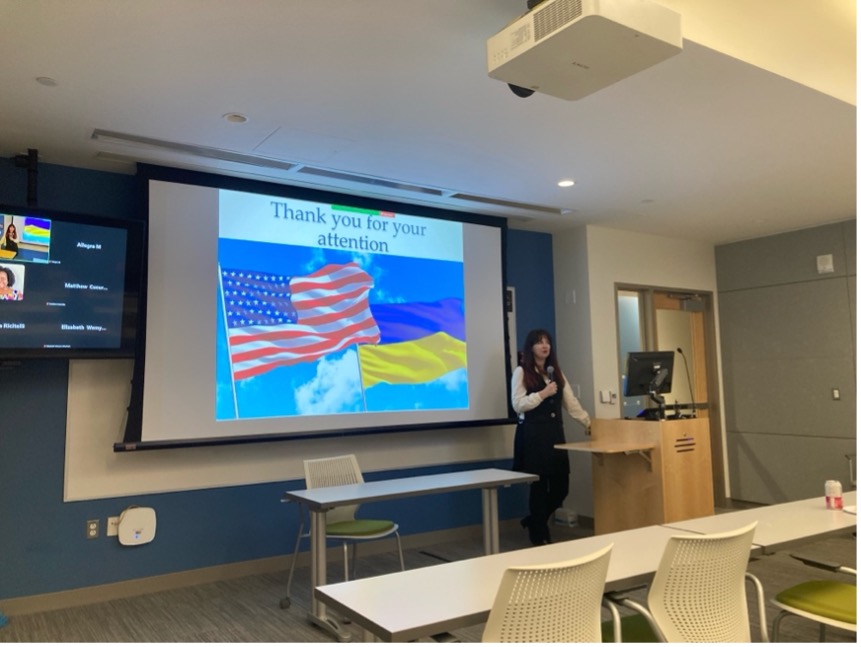By Diana Namumbejja Abwoye, MSN, FNP-BC
PhD Candidate
Poltava State Medical University Professor Dr. Kateryna Lokes recently gave a guest lecture at Yale School of Nursing (YSN) to share her wrenching experience in the dual roles of educator and global health advocate in Ukraine during the ongoing war.
“If other countries stop supporting us, we could be destroyed,” Dr. Lokes said.
Dr. Lokes visited the Global Health and Climate Change course taught by Sandy Cayo, DNP, FNP-BC, FAAN and spoke to an audience of global health leaders, nursing professionals, and students. Dr. Lokes’s visit was made possible by the University of New Haven’s School of Health Sciences and Fulbright Ukraine. As a recipient of the prestigious BridgeUSA Ukrainian Academic Fellows Program (UAFP) fellowship, Dr. Lokes spent four weeks both teaching and learning from the University of New Haven’s faculty and students. In Dr. Cayo’s class, Dr. Lokes offered a sobering look into how the Russian invasion transformed Ukraine’s healthcare system and provided a firsthand account of resilience, loss, and the urgent need for international solidarity.
“Participants were deeply moved by the work that is currently underway to maintain healthcare in times of incredible turmoil,” Dr. Cayo said. “As we prepare our students for the ever-changing climate of health globally, speakers like Dr. Lokes help to bring real-world cases to the classroom and invite thoughtful, innovative, and intentional solution-based discussion to healthcare’s most critical challenges.”

Dr. Sandy Cayo, assistant professor, and director of GEPN Excellence and Dr. Kateryna Lokes, professor at Poltava State Medical University in Ukraine. Photo credit: Asia Neupane
A Healthcare System Under Siege
Dr. Lokes described Ukraine’s healthcare system as steadily modernizing before the war. Advancements included the introduction of the National Health Service of Ukraine (NHSU), which provided universal healthcare access through a combination of public and private partnerships.
Dr. Lokes said that first the COVID-19 pandemic strained the system and then the full-scale Russian invasion in 2022 pushed it to the edge.
In her presentation, Dr. Lokes shared some grim statistics:
- Ukraine now holds the highest mortality rate and lowest birth rate in the world.
- Over 11,000 civilian deaths have been recorded since the invasion, with actual numbers likely far higher.
- The country leads globally in the percentage of its population reliant on artificial limbs.
Mental Health: The Invisible Crisis
Beyond physical injuries, Dr. Lokes discussed how the war has inflicted deep psychological wounds. She described widespread post-traumatic stress disorder (PTSD), depression, and anxiety, exacerbated by the destruction of homes, communities, and families. Children face unique challenges. Many have witnessed violence, endured displacement, and lost loved ones.
“We have children who can recognize the sound of a rocket or drone,” she said. “That is not a skill any child should have.”
Efforts are underway to address these mental health challenges, including deploying psychologists to affected areas and increasing public awareness about the importance of seeking psychiatric help. However, Dr. Lokes admitted the scale of the crisis has overwhelmed Ukraine’s healthcare system.
Global Health and Humanitarian Implications
The war’s ripple effects extend far beyond Ukraine’s borders. Antibiotic resistance, interruptions in chronic disease management, and refugee health have emerged as global health concerns. Dr. Lokes highlighted the alarming rise in antibiotic-resistant infections due to disrupted medical supply chains and delays in treatment.
“Antibiotic resistance isn’t just Ukraine’s problem—it’s a problem for the world,” she emphasized.
She also discussed the challenges of supporting Ukraine’s more than 8 million displaced citizens, many of whom are navigating trauma while adapting to life in host countries.
Reflections from the YSN Audience
Dr. Lokes’ presentation sparked a robust dialogue, with attendees exploring the implications of Ukraine’s crisis for global health policy and practice. One YSN student attendee captured the complexity of the discussion by stating, “What’s happening in Ukraine is a case study in resilience and tragedy, with lessons for global health that are still being written.”
- Mental Health Systems in Conflict Zones: A student specializing in psychiatric nursing asked how Ukraine’s mental health system is coping with the crisis and what measures healthcare professionals can take to address growing PTSD cases. Dr. Lokes emphasized the importance of destigmatizing mental health care and training more psychologists to address both immediate and long-term trauma.
- Sustainable Long-Term Solutions: Responding to a question about planning for long-term healthcare challenges, Dr. Lokes admitted that no country is ever truly ready for the prolonged crises caused by war, “but we must invest in healthcare systems that can adapt and endure.”
- The Role of the United States and Allies: A participant highlighted the future instability of U.S. support for Ukraine, prompting Dr. Lokes to underscore Ukraine’s reliance on foreign aid. “Our survival depends on decisions made by the U.S. and Europe,” she said, comparing the current situation to post–World War II rebuilding efforts.
- Refugee Support for Children: A pediatric nursing student asked how to help Ukrainian refugee children stay connected to their heritage while managing trauma. Dr. Lokes highlighted the importance of cultural education and psychological support, especially for children who have lost family members.
- Access to Chronic Care in War Zones: A question about ensuring access to treatment for chronic diseases like HIV and diabetes prompted Dr. Lokes to explain Ukraine’s efforts to maintain free treatment and medical logistics in areas under government control. However, she noted the challenges in occupied territories where Russian forces restrict healthcare access.

Dr. Kateryna Lokes, professor at Poltava State Medical University in Ukraine presenting at Yale University School of Nursing. Phot credit: Asia Neupane
A Message of Resilience
Dr. Lokes closed her presentation with a plea for continued international support. She described Ukraine’s precarious future, shaped by the destruction of its healthcare infrastructure, the displacement of millions, and the enduring psychological scars of war.
Despite the challenges, her message was one of resilience. She highlighted the determination of Ukrainian doctors, nurses, and citizens who continue to provide care, rebuild communities, and fight for their country’s survival.
“This story is far from over,” Dr. Lokes said. “What we need now is sustained global support, innovative healthcare solutions, and solidarity.”
